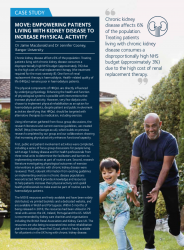Bangor joins other research led universities in contributing to the Physiological Society Knowledge Exchange report.
Physiology is one of the 3 core disciplines within Sport and Exercise Science and Bangor University staff are helping to lead the way in the knowledge exchange (KE) of this area. Physiology is the science of life, and research in physiology helps us to understand how the body works in health, what goes wrong in disease, and how it responds and adapts to the challenges of everyday life. KE describes the multiple interactions between higher education institutions and businesses, public services, charities, public engagement, communities, policy makers and government to create societal and economic benefit.
 The Physiological Society and The National Centre for Universities and Business (NCUB) were involved in co-creating KE project. Bangor University was asked to contribute staff time and case studies to the production of this report alongside other universities with excellent reputations in sport science research including Kings College London, Loughborough, Manchester and Oxford Universities. The project highlights the value that learned societies bring to civil society beyond the benefits they offer their membership and demonstrates a new way of benchmarking a specific discipline against previous national approaches to understanding KE among the academic community. It showcases the variety and value of KE as well as highlighting the need to ensure that universities and businesses alike recognise the importance of – and nurture - collaboration across sectors. The report aims to shine a spotlight on the specific contributions to KE made by physiology by providing estimates of the level of physiology-related KE and exploring the activities and motivations of physiologists working with partners beyond higher education.
The Physiological Society and The National Centre for Universities and Business (NCUB) were involved in co-creating KE project. Bangor University was asked to contribute staff time and case studies to the production of this report alongside other universities with excellent reputations in sport science research including Kings College London, Loughborough, Manchester and Oxford Universities. The project highlights the value that learned societies bring to civil society beyond the benefits they offer their membership and demonstrates a new way of benchmarking a specific discipline against previous national approaches to understanding KE among the academic community. It showcases the variety and value of KE as well as highlighting the need to ensure that universities and businesses alike recognise the importance of – and nurture - collaboration across sectors. The report aims to shine a spotlight on the specific contributions to KE made by physiology by providing estimates of the level of physiology-related KE and exploring the activities and motivations of physiologists working with partners beyond higher education.
Dr Sam Oliver from the School of Sport, Health, and Exercise Sciences (SHES) participated in the Senior Physiologist KE insight workshop which informed the data presented in the report. Additionally, research from Bangor staff, Dr Oliver, Dr MacDonald, and Dr Cooney feature in the report across 2 separate case studies. The inclusion highlights both the quality of the KE research conducted at Bangor and the impact of our staff in helping shape the future of the research landscape.
Dr Oliver said ‘It has been a real privilege to be part of this project in promoting and improving the UK’s knowledge exchange’.
 Dr Gavin Lawrence (also from SHES) highlights that ‘having research SHES (around the separate themes of hydration and kidney disease) feature in the report is super exciting and really helps place the School, and wider Institution, at the forefront of Knowledge Exchange activity.’
Dr Gavin Lawrence (also from SHES) highlights that ‘having research SHES (around the separate themes of hydration and kidney disease) feature in the report is super exciting and really helps place the School, and wider Institution, at the forefront of Knowledge Exchange activity.’
The report concludes that physiological KE is an essential component of dealing with health challenges (e.g., COVID-19) and meeting major societal challenges of the coming decades (e.g., our ageing population and growing obesity issues). It also identifies that barriers persist in ensuring the future of academics contribution to KE in areas such as dedicated contracted time, identifying partners, and visibility of disciplines with those national organisations responsible for promoting KE in institutions, industry and the not-for-profit sector. This report outlines a series of recommendations to support academics to overcome barriers to undertaking KE activity and ensure that the UK is the best place in the world to conduct, commercialise and benefit from KE based research.
Prof. Paul Spencer (Pro Vice-Chancellor for Research & Innovation) said that ‘This report is a superb demonstration of the wider impact of our research excellence. It's a testament to the quality of our Knowledge Exchange (KE) that Bangor was the only Welsh institution asked to join this prestigious study which also included the Universities of Oxford, Manchester, Southampton, Loughborough, Glasgow and Queen's Belfast. Going forward KE will be an increasingly important component of the University’s new ambitious Research & Innovation strategy.'
To read the report and its recommendations in full click here
Publication date: 5 March 2021
